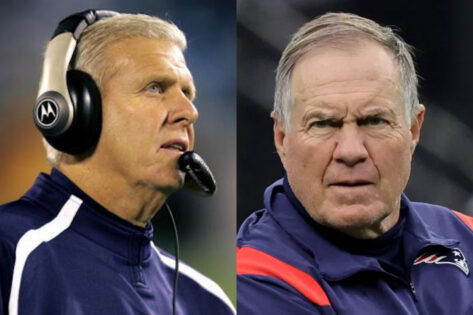Let’s get one thing clear right off the snap—tight end battles aren’t always played on Sundays. Sometimes, the real hits happen in meeting rooms and roster decisions. And according to former Jets first-rounder Anthony Becht, the tight end room in New York during the early 2000s had enough behind-the-scenes jabs and silent turf wars to make any HBO documentary blush.
“Parcells drafted me. Al Groh was my first head coach,” Becht said on a podcast recently, “and then they all left year one.” That’s how the veteran tight end summed up the start of his NFL journey. Drafted into what seemed like stability, Becht quickly learned the league’s most brutal truth: nothing stays the same—not even your coaching staff.
Let’s rewind the game film. When Bill Parcells took over the Jets from 1997-1999, he brought structure, attitude, and a playbook thicker than a New York pastrami sandwich. He drafted Becht in 2000—a signal that the Jets saw potential in the West Virginia product to become the security. But things unraveled fast. Parcells stepped back. Al Groh, his handpicked successor, took over for one season.
And then came Bill Belichick—or, should we say, the coach who almost was. He showed up, hit the treadmill, and ghosted the Jets faster than a busted coverage. He signed his resignation after a day as the “HC of the NYJ,” and scribbled on a napkin. Cue the chaos.
“Even though I started every game as a Jet, those [first 5-6 years] were tough,” Becht said. “Because, you know, you want to be more involved, but they draft another guy, and they’re always trying to take your job—but they couldn’t.” The subtext? Locker room jealousy. A not-so-secret tight end cold war brewed after both the Bills left and Al Groh handed the leash to Herman Edwards in 2001.
Football-Harry Carson Harry Carson, New York Giants defensive linebacker giving Coach Bill Parcells a Gatorade shower after winning the 1987 Superbowl. Pasadena Rose Bowl CA USA Copyright: xStevenxE..xSutton/DUOMO/PCNx FO8702-100000
Herman didn’t ship Becht out, but you didn’t need to read the entire playbook to know something was off. The guy kept showing up and doing his job, but the love wasn’t mutual. It wasn’t just Becht feeling it. After Parcells exited stage left, and Groh one-and-done’d his way to Virginia, the Jets’ coaching carousel kept spinning. The identity Parcells had installed began to fade.
The Jets never really found their next great TE until years later. And even then, it was mostly by accident. For Becht, the writing was always on the whiteboard: adapt or exit. “If I wanted to stick around in the NFL,” he said, “I better learn how to block at a very high level, because there won’t be any value for me.”
That’s the thing with tight ends in the early 2000s—you either became a receiving threat like Tony Gonzalez or you got your hands dirty in the trenches. Becht chose the latter. “That’s what extended me to that 12 years during my career.” It wasn’t flashy, but it was effective. He signed off, recording 188 receptions for 1,537 yards and 21 touchdowns over his NFL career, averaging 8.2 yards per catch. He played as a TE but got known for his is blocking and red zone presence. And however ok that stat-line reads, to this day, he gives credit to Bill Parcells.
Bill Parcell’s did his way, but that stuck with players for years to come
When Bill Parcells stepped down as Jets head coach in 2001, he didn’t leave with a bang. No curtain call. No ego-fueled farewell tour. Just a line, a rather true admission of what he went through, in the halls of Florham Park: “People don’t realize how all-consuming this job is—at least the way I do it.”
Fast forward to 2021. Former Jets TE Anthony Becht hops on Vinny Testaverde’s new team-run talk show In the Pocket—and drops a gem. A training camp memory that hits different. Rookie year, first-round pick, fresh off a preseason touchdown against New Orleans. Becht’s thinking, “I’ve arrived.” But Parcells? He had other plans.
“He bends over, puts his hand on my shoulder and says, ‘Hey, listen, Becht, if you ever block like that again on film against another team, I’m going to send your you-know-whats so far out of here.’” No sugar. No trophy for showing up. Just straight Tuna.
It wasn’t about killing confidence—it was about building players. Humbling moments like that stuck with Becht. “I thought I had a good game, but I became a blue-collar guy from that point on,” he said. Parcells didn’t hand out stars for stat lines. He built football minds. Grit over gloss. Execution over ego.
Testaverde chimed in, “Coach Parcells had a way of doing things that kept you humble.” No false praise. No fake hype. Just accountability, every single rep. Because for Parcells, coaching wasn’t about babysitting—it was about molding guys who could last in a league that doesn’t care how you felt yesterday. Just ask Becht. Or anyone who’s ever worn Jets green under Tuna.
The post Drafted by Bill Parcells, Voice of NY Jets Confirms Locker Room Jealousy Between TEs After Bill Belichick appeared first on EssentiallySports.
